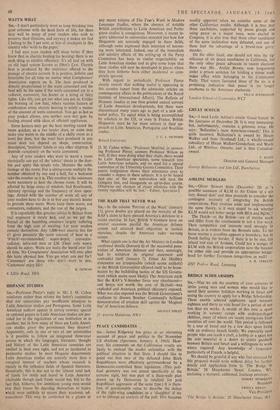Sue—Professor Pierce's reply to Mr. J. M. Cohen reinforces rather
than refutes the latter's contention that our universities pay insufficient attention to Latin American studies and Portuguese. Some Latin American authors appear in survey courses; special or optional papers in Latin American studies are pro- vided for in the regulations of one institution or in another; but in how many of these are Latin Ameri- can studies given the prominence they deserve? Apparently, only in one or two of our universities is it possible to follow an integrated three-year qourse in which the languages, literature, thought and history of the Latin American countries are sludied in their own right, and not as incidental to peninsular studies. In most Hispanic departments Latin American studies are scarcely more than a farginal interest of teachers whose research is trfainly in the orthodox fields of Spanish literature. Essentially, this is due not to the 'almost total lack of funds for study and travel in Latin America' (deekable though such funds would be), but to the fact that, hitherto, few ambitions young men would risk their future by devoting themselves to topics ivhich were unlikely to secure their academic ad- vancement. This may be confirmed by a glance at any recent volume of The Year's Work in Modern Language Studies, where the absence of notable British contributions to Latin American and Portu- guese studies is conspicuous. Moreover, a recent in- quiry addressed to universities revealed just how few Hispanists are seriously engaged in these fields, although some expressed their intention of becom- ing more interested. Indeed, one of the immediate and salutary effects of the setting-up of the Parry Committee has been to confer respectability on Latin American studies and to give some hope that these studies will now be developed in places where they have hitherto been either incidental or com- pletely ignored.
With regard to periodicals, Professor Pierce clearly reveals that nothing useful is appearing in this country (apart from the admirable articles on contemporary affairs in the publications of the Royal Institute of International Affairs). The Bulletin of Hispanic Studies at one time printed annual surveys of Latin American developments, but these were discontinued many years ago as part of a new edi- torial policy. To equal what is being accomplished by scholars in the US, or even in France, British Hispanists must be far more serious in their ap- proach to Latin American, Portuguese and Brazilian studies.
J. C. J. METFORD
Bristol University [J. M. Cohen writes 'Professor 1VIetfdrd, in answer- ing Professor Pierce, answers Professor Wilson as well. If they were doing what they claim, there would be Latin American specialists, some research into Latin American subjects, and no peed for a special committee of the University Grants Committee. Their patent indignation shows their reluctance even to consider a degree in these subjects, It is to be hoped that one of the new universities will turn the Gongora line, and inaugurate an up-to-date course. Otherwise our chances of closer relations with the twenty republics will be lost.'--Editor, Spectator.]






























 Previous page
Previous page